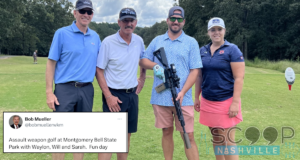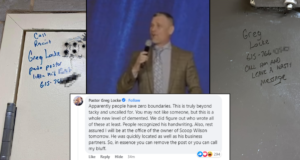Late Friday afternoon, MNPD Chief Steve Anderson sent the email below to every member of the Nashville Metro Council, in regards to the current STRP debate and the upcoming votes in the council.
We were rather fond of this reminder from the Chief – reminding folks (Like Brett Withers) that they can’t call the police because someone has a blow up doll in the window of their AirBNB: “It is often assumed that police officers have the authority to order persons to comply with the law or with good behavior. Police officers do not. Police officers can warn, suggest, or persuade. If those methods are not successful, police officers can arrest persons who do not comply with the law—assuming there is a violation of the criminal law that would warrant arrest.”
He also shot down the absurd suggest that ‘rowdiness’ arrests and citations be made:
“It is doubtful that any court anywhere would sustain charges brought for “rowdiness”.
The letter basically boils down to the Chief putting his foot down as to not bring his department into this debate – on either side.
And finally – every nosy neighbor in East Nashville needs to read, and have it notarized that they understand this line from the chief:
“The random blowing of horns, loud talking, strangers lurking about, or other disturbing or alarming activity caused by persons who have no long term investment in a Nashville neighborhood most often do not rise to the criminal conduct threshold. Therefore, police officers have little or no authority to address these issues.”
There are a lot of other hidden gems in this letter, here it is, in full:
From: “Anderson, Steve (MNPD)”
Date: January 19, 2018 at 4:51:25 PM CST
To: Council Members
Subject: Short Term Rentals
Ladies and Gentlemen of the Metropolitan Council,
As the original Short Term Rental issue was first brought before Council, I confess to paying little attention. Because it did not appear to involve the Police Department, I did not examine the bill in detail. I gave no thought to the long term consequences that we now see. Certainly, I did not foresee the significant community divide that this issue has created.
I suspect that many of you, like me, were caught unaware. Now, with constituents on both sides, I can sense that many of you are looking for a solution. At present, there are at least two (2) bills that seek to find some consensus to this dilemma. While I do have some observations, I do not have a solution.
In that the Police Department has now been drawn into this debate, and although admittedly late, I feel compelled to provide you with as much information as possible, from the perspective of the Department. The following is neither in support of, or in opposition to, any of the pending bills. It is merely information you may or may not elect to utilize as you come to your decision.
The Police Department, at best, can only be a small part of any solution. The following are my observations concerning the ideas brought forth that would involve the Police Department:
- It has been suggested that ten (10) officers be assigned exclusively to issues involving STRs. There are alternate ways this could be accomplished. One, ten officers could be taken out of neighborhoods and assigned these duties. Two, ten additional officers could be hired so as not to jeopardize public safety by removing existing officers from their presently assigned duties. The suggestion to add ten additional officers did not carry with it a proposal to hire ten additional officers ($800,000 to $1,000,000 annually, salary, benefits and equipment). Therefore, devoting these resources to the STRs would necessarily be at the expense of the neighborhoods.
- It has been suggested that officers be held in reserve on peak nights to answer calls for service involving STRs in a priority manner. It must be understood that peak nights for STR issues are also peak nights for all other issues. It would not be responsible for this government to sanction delaying calls for service that involve the safety of citizens, or even the loss of property, while officers are standing by waiting for a call involving an STR. Aside from the public safety issue, other officers (your officers) could be forced to answer calls without appropriate back-up due to the proposed priority to be given calls concerning STRs.
- It is often assumed that police officers have the authority to order persons to comply with the law or with good behavior. Police officers do not. Police officers can warn, suggest, or persuade. If those methods are not successful, police officers can arrest persons who do not comply with the law—assuming there is a violation of the criminal law that would warrant arrest.
- Even assuming an adequate number of officers are available to answer STR calls, the options available are very limited. The ordinances being cited as the tools for enforcement, are just that—ordinances. Ordinances are civil in nature and do not carry with them the authority of arrest. If persons violating the ordinances elect not to comply, they can be issued a citation—assuming they elect to present themselves for service. This then begs the question, if multiple guests are present, how would it be determined who is to receive the citation? As an aside, for the most part, persons from out of town face little consequences if they elect to ignore the civil citation, which mandates only a fine.
- Most of the noise ordinances address electronic amplification of music or other sound. There is the “rowdiness” ordinance that has been suggested. However, it is unlikely those types of charges would be sustained in court. It is doubtful that any court anywhere would sustain charges brought for “rowdiness”.
- It should also be noted that much of the aberrant behavior being reported by citizens appearing before you in the public hearings do not rise to a violation of Tennessee law. However, the behaviors being described are very concerning, especially in residential neighborhoods.
- And, if a similar disturbance call comes in involving a private residence, would that call be prioritized as normal while officers are kept in waiting for an STR disturbance call.
As to the process itself, the following are some observations gathered during the two public hearings on this matter.
- For the most part, the complaints do not rise to the level of a criminal violation wherein the Police Department could supply a remedy. They are, however, very legitimate quality of life concerns. While the Police Department prides itself in addressing quality of life concerns in our neighborhoods, those measures are limited to enforcing street level drug activity, prostitution, speeding and other concerns that carry criminal consequences. The random blowing of horns, loud talking, strangers lurking about, or other disturbing or alarming activity caused by persons who have no long term investment in a Nashville neighborhood most often do not rise to the criminal conduct threshold. Therefore, police officers have little or no authority to address these issues.
- It is noted that the present and proposed ordinances carry only a sanction of revocation for one year. Unless there is sufficient due process, involving testimony of neighbors, etc., there is a likelihood that the courts may find this excessive. It would seem that lesser and summary penalties such as 10, 20, 30, 60 day suspensions might work better to bring the owner into compliance.
- Similarly, the owner’s name and contact information should be prominently posted on site so that persons suffering a disturbance have some method of recourse. Owners who do not make themselves available to receive disturbance calls should be subject to sanction.
- The ordinances speak of “documented complaints”. It is unclear what would constitute a documented complaint. That is, what is the standard of proof that would constitute a documented complaint.
- It seems incongruent with other provisions of the Metropolitan Code that the owner is not required to report to the scene to remedy an issue involving a STR. For example, the owner of premises protected by an alarm is required to report to the scenewithin one hour should that alarm be activated. [MC 10.60.100 D.] It would seem that a responsible owner would be willing to respond to the unattended STR to remedy any neighborhood complaint.
- If a citizen of Nashville wishes to ensure that he or she is not living next door to a STR, essentially a commercial venture, where in the county can he or she find that assurance? Should there be areas of the county set aside to provide that protection?
- It seems inconsistent that an 80 year old lady who would like to take in sewing to supplement her income would be precluded from operating a commercial business in a neighborhood zoned to prohibit commercial ventures, but an STR would be permissible.
- At first, Councilman O’Connell’s proposal to authorize the building of hotels in residential areas appeared absurd– but it now appears that was the point. Although it was handily voted down, it did cause some reflection and consideration. It may be that some persons would rather have a hotel next to them than an STR. Hotels have night managers readily available to act immediately on complaints. And, if disturbances continue, complaints filed with the corporate office are often very effective in bringing local management into compliance.
Finally, while this is certainly a matter for the Council to decide, I would think that the complaints of the citizens whose lives have been impacted in a negative manner cannot, or at least, should not, be ignored. In that it now appears that there is a movement by some to shift the responsibility for managing the short term rental industry to the Police Department, the above is to point out that the Police Department cannot be a substitute for responsible management by the owners, especially the absentee owners, of short term rental sites.
Again, this correspondence is not in support of or in opposition to any of the pending ordinances. It is intended to provide you with pertinent information concerning the issues surrounding STRs. Hopefully, it will also serve as a reminder that, in my view, these issues will not disappear, even with the passing of new legislation.
Steve Anderson
Chief of Police
Metropolitan Nashville Police Department




